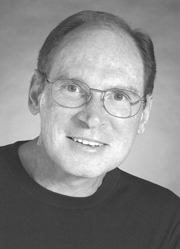|
|
|
MAKING TIME TO CHANGE
By Dr. Robert Wicks • Maryland
Religious literature, especially that of Buddhism and classic Christian writings, suggests we keep our own death before our eyes. An image of life used in Tibet is that of getting into a boat that is about to
go out to sea and sink!
“How morbid!”, most people would respond today. But since it’s a fact that we are going to die, isn’t it silly not to appreciate our limits so our life can be rich within its boundaries?
Such a recognition would make the time of our death a surprise but not a shock. And besides the religious value of such preparation, it would also help us make time to think about how we want to live our life, and what we want to change now, while we still have life in us.
I can always tell when I or others of my acquaintance are avoiding this much needed space for self-reflection because of the (in)famous defensive phrase which is invariably used: “I’m too busy to take out time to reflect, renew, and change myself!”
We seem to always have time to worry, preoccupy ourselves, eat or drink too much, scheme against the other person, have an affair, watch hours of mindless television, try to control/please others, complain endlessly about our world, or work impulsively. Yet we say we don’t have time to reflect on who we are and where we are going. Crazy? Yes, crazy! But aren’t most of us like this? The question is, do we want to remain a part of the irrational “crowd”?
One of the most deceptive ways people avoid being reflective is to claim that being busy is practical and necessary, whereas reflecting on life is a luxury, navel-gazing for the rich and indolent. To them I say: How practical is it to run as fast as you can without taking time to pick up your head and see where you are going? Do we wait until we are ready to die to ascertain whether the life we have lived was what we wanted? Or, do we do it every day, week, month, and year?
So, one of the essential rules of inner freedom and change is to ensure you have time to reflect on your day, week, month, year, and life as it develops. This is not a luxury but one of the most practical things you and I can do. Otherwise, the only time we make decisions or vows, if we can even call them that, is on New Year’s Eve, when we are in a bad way, or feeling hurt. The reality though, is that decisions to change such as these guarantee no profound change at all. “I’ll never do that again!”, more often than not will just turn into doing the same thing over and a feeling of being trapped in old behavior. Change, like anything good, needs time to ponder and plan. It’s the practical thing to do. And so, if we are serious about being free from excessive influence by our past experience or our present situation, and wish to be free to constantly change and grow, we need to prioritize reflective time. In this way, quiet moments become the valuable place we know we can enter for reappraisal and new learning about ourselves and our surroundings.
Excerpted with permission of Sorin Books, from chapter seven of Simple Changes, by Robert K. Wicks,© 2000. Available at bookstores, online retailers, 800-282-1865 and www.sorinbooks.com.
Author of more than twelve books on spirituality and personal growth, Dr. Wicks is a professor in the Graduate Programs in Pastoral Counseling at Loyola College in Maryland. Wicks maintains a private
practice and is a frequent lecturer in the U.S., Canada, India, Europe, Central America, Asia, & New Zealand.
|

